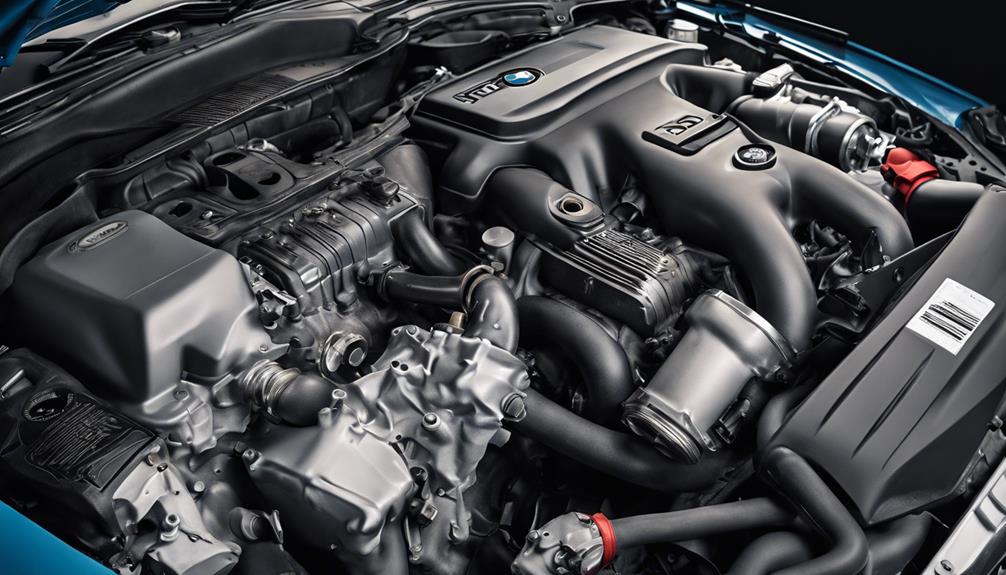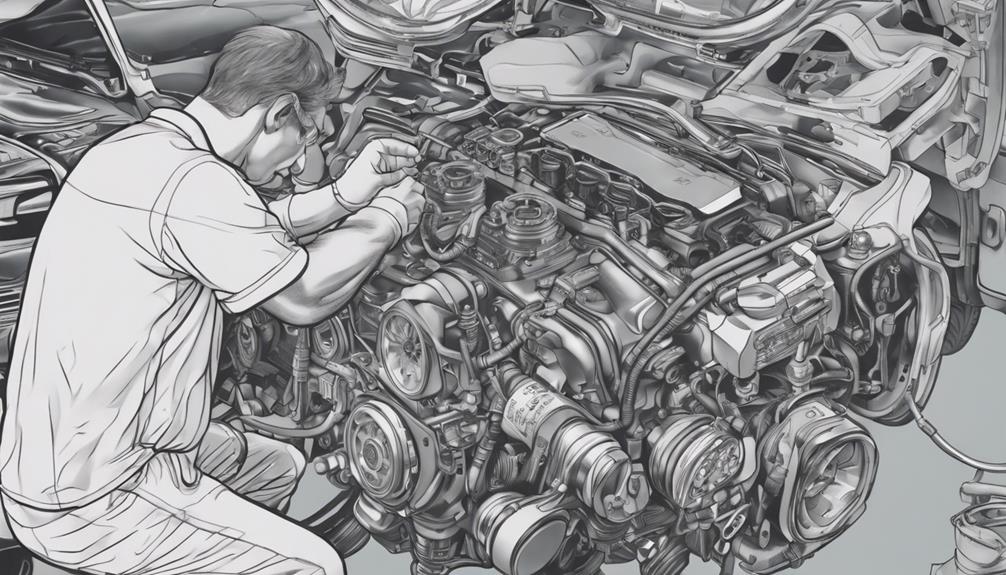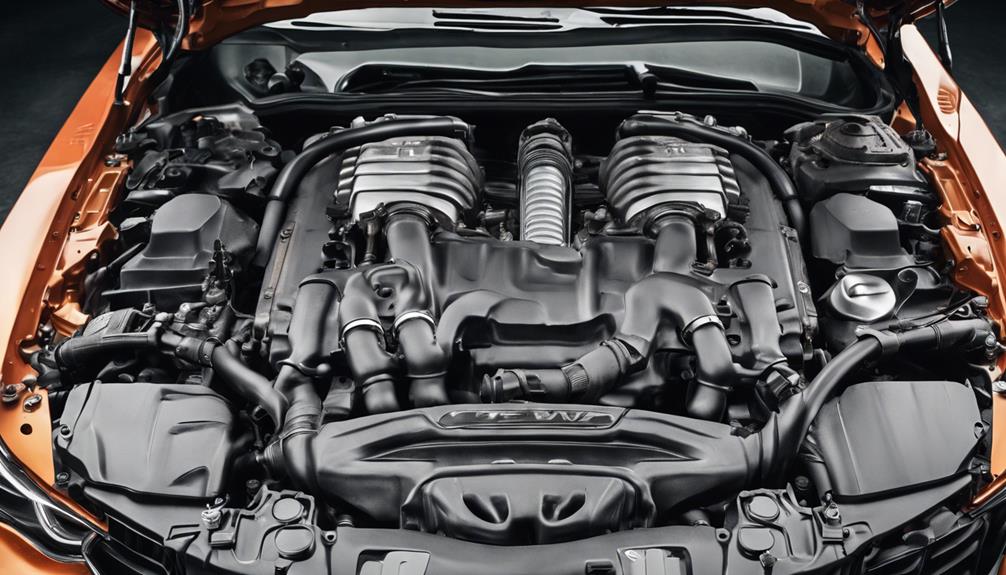If you're dealing with BMW 325i electrical problems, keep an eye out for steering wheel lock and ignition switch issues like dashboard symbols and key difficulties to avoid further damage. Be cautious of starting troubles and intermittent glitches, or you risk battery drain and safety feature malfunctions. Seeking professional help for a thorough diagnosis and resolution, including checking for cable damage and fuse malfunctions, is essential for efficient repair. Understanding these common electrical issues thoroughly can help you effectively address your BMW's intricate electrical complexities.
Key Takeaways
- Steering wheel lock issues can lead to key breakage and ignition switch malfunctions.
- Address electrical problems promptly to prevent battery drain and safety compromises.
- Look out for alternator troubles, cable damage, and fuse malfunctions in the BMW 325i.
- Analyze fault codes for diagnosis, and prevent power loss by monitoring alternator performance.
- Seek professional help for accurate diagnosis and resolution of BMW 325i electrical problems.
Steering Wheel Lock
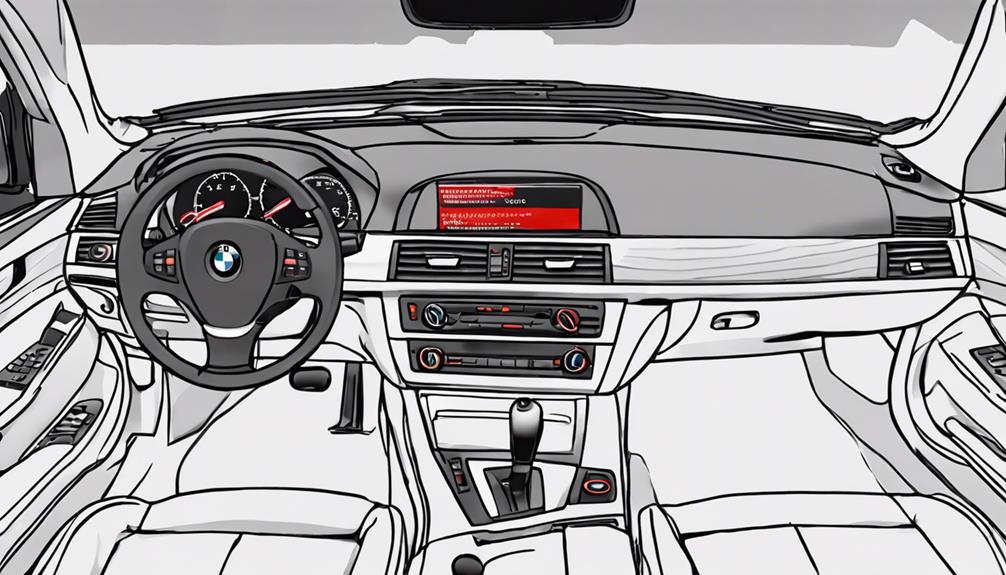
If you encounter a steering wheel lock issue in your BMW 325i, it's important to address it promptly to prevent potential key breakage and further electrical complications. When your BMW experiences a locked steering wheel due to electrical issues, you may notice the steering lock symbol illuminating on the dashboard. This situation can lead to an inability to turn the key in the ignition, signaling a steering wheel lock problem. Applying force to turn the key in such a scenario could result in key breakage, exacerbating the issue.
Ignoring an electrical issue causing the steering wheel lock can worsen over time, potentially leading to more severe problems down the line. It's essential to seek assistance from a BMW dealership when faced with a steering wheel lock issue in your BMW 325i. By addressing this problem promptly, you can prevent further complications and maintain the continued smooth operation of your vehicle.
Ignition Switch Malfunction
If your BMW 325i experiences ignition switch malfunction, one of the key symptoms to look out for is the absence of the clicking sound when you turn the key.
This issue can prevent your vehicle from starting and may even lead to engine flooding with repeated failed start attempts.
Ignition switch problems are vital due to their direct impact on the car's electrical system, so seeking professional assistance from a BMW dealership is advisable for proper diagnosis and repairs.
Ignition Switch Symptoms
Experiencing a lack of clicking sound when turning the key in the ignition may indicate a faulty ignition switch in your BMW 325i. This symptom is one of the common electrical problems that BMW 325i owners encounter.
Ignition switch issues can lead to an inability to start the vehicle, risking engine flooding if left unaddressed. When faced with ignition switch symptoms, it's advisable not to repeatedly attempt to start the car, as this can exacerbate the problem.
Seeking assistance from a BMW dealership or a qualified mechanic is recommended to diagnose and resolve ignition switch malfunctions properly. Ignoring these signs could result in more severe electrical issues down the line, potentially causing further damage to your vehicle.
Electrical System Implications
The ignition switch malfunction in your BMW 325i can have significant implications on the overall functionality of the electrical system. When the ignition switch is faulty, it directly impacts various components within the electrical system, potentially causing a chain reaction of issues.
Here are some key considerations:
- Starting Troubles: The vehicle may fail to start or experience intermittent starting problems.
- Electrical Component Failures: Malfunctioning ignition switch can lead to failure of other electrical components.
- Battery Drain: Continuous attempts to start the vehicle can drain the battery quickly.
- Safety Concerns: A faulty ignition switch may compromise the overall safety features of the vehicle.
- Diagnostic Expertise: Seeking professional help from a BMW dealership is essential for accurate diagnosis and resolution of ignition switch issues.
Repair and Solutions
When addressing ignition switch malfunction in your BMW 325i, the focus shifts to implementing effective repair and solutions. The ignition switch is an essential component of the electrical system, and when it malfunctions, it can prevent your vehicle from starting. To tackle this issue, consider the following repair and solutions:
| Repair and Solutions | Description |
|---|---|
| Seek Professional Help | Consult a dealership for expert assistance. |
| Check for Loose Connections | Confirm all electrical connections are secure. |
| Test the Ignition Switch | Verify the switch's functionality. |
| Consider Replacement | If needed, replace the ignition switch. |
Alternator Troubleshooting
If your BMW 325i is showing signs of a failing alternator, immediate troubleshooting is crucial to avoid additional electrical issues. Here's what you should consider:
- Check Battery Voltage: Use a multimeter to test the battery voltage. A healthy battery should read around 12.6 volts.
- Inspect Drive Belt: Confirm the alternator drive belt isn't loose, cracked, or worn out. A defective belt can result in alternator failure.
- Look for Warning Lights: Pay attention to any warning lights on the dashboard indicating charging system issues.
- Test Alternator Output: Use a multimeter to check the alternator output. A properly functioning alternator should produce around 13.8 to 14.2 volts.
- Listen for Unusual Sounds: Unusual noises like grinding or whining could indicate alternator problems that require attention.
Following these steps can help identify alternator issues early and prevent further electrical complications in your BMW 325i.
Cable Damage Signs
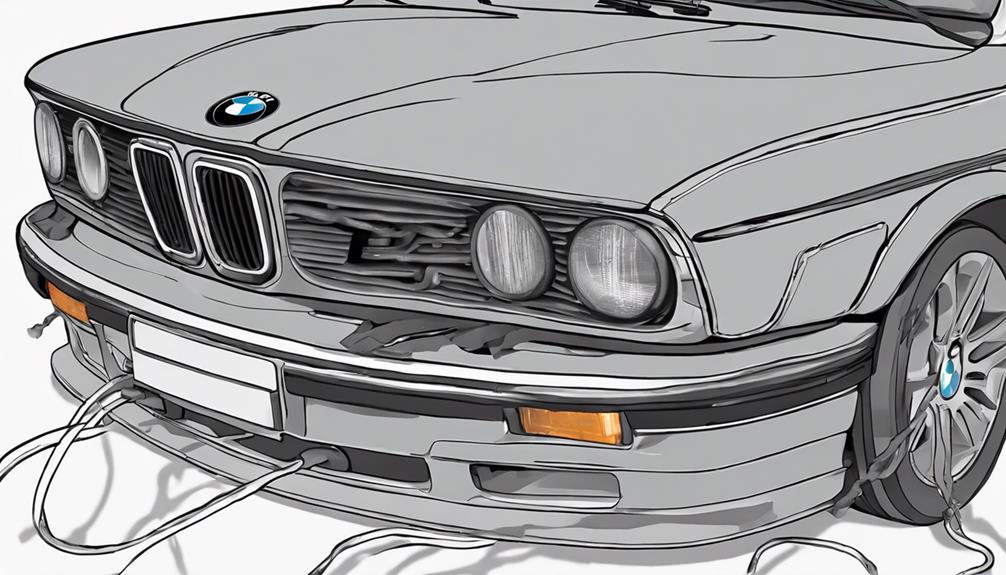
Spotting signs of cable damage in your BMW 325i is vital for maintaining ideal electrical function in your vehicle. Common BMW electrical issues often stem from damaged cables, which can disrupt the flow of electricity within your car. Look out for frayed, broken, or visibly damaged cables as they can lead to various power-related problems. Cable damage is a commonly overlooked electrical issue that can cause a range of internal system problems. The damage to cables in BMW 325i can be due to wear and tear over time or even vandalism. If you notice any signs of damaged cables, it is essential to address them promptly to avoid further complications. Identifying and replacing damaged cables is a relatively easy fix once the issue is identified. Below is a table outlining common signs of cable damage in your BMW 325i:
| Signs of Cable Damage | Description |
|---|---|
| Frayed Cables | Visible wear and tear on the cable |
| Broken Cables | Severed or disconnected cables |
| Damaged Insulation | Exposed wires or insulation deterioration |
| Burn Marks | Scorching or burning on the cable |
Fuse Malfunction Symptoms
If you notice warning lights flashing on your BMW 325i's dashboard, this could be a sign of a fuse malfunction.
A sudden loss of power to specific electrical components, such as lights or power windows, might indicate a blown fuse.
An overall electrical system failure could also point to potential issues with the fuses in your vehicle.
Warning Lights Flashing
When caution lights begin flashing on the dashboard of your BMW 325i, it often indicates a potential fuse malfunction necessitating immediate attention to prevent electrical issues and system failures. Neglecting these caution lights could result in safety hazards and additional damage to your vehicle.
To tackle this problem effectively, follow these steps:
- Check the ABS, airbag, and check engine lights for irregularities.
- Examine the fuses associated with the affected caution lights.
- Replace any defective fuses promptly to prevent electrical system failures.
- Guarantee proper installation of new fuses to avoid future malfunctions.
- Regularly monitor caution lights to detect and address fuse issues early on.
Following these steps will help uphold the electrical systems of your BMW 325i and deter more significant problems.
Loss of Power
Loss of power in your BMW 325i can often be traced back to a blown fuse causing disruptions in the electrical system. When a fuse malfunctions, specific components like power windows or dashboard lights may cease to function, impacting the overall electrical power in your vehicle.
Blown fuses are culprits for the loss of power to critical systems, leading to a frustrating drive. Identifying and replacing the faulty fuse is essential to restore proper power flow and functionality to your BMW 325i.
Regularly checking and replacing fuses as needed can help prevent such electrical issues and maintain a consistent power supply throughout your vehicle, keeping you on the road smoothly.
Electrical System Failure
Experiencing unexpected dashboard warning lights illuminating in your BMW 325i may signal symptoms of electrical system failure, often associated with fuse malfunctions. When facing electrical issues, common problems with fuse malfunctions can manifest in various ways:
- Power windows or lights not functioning properly.
- Sudden loss of power to specific systems like the radio or air conditioning.
- Intermittent electrical failures caused by a blown fuse.
- Difficulty diagnosing the root cause of electrical problems.
Checking and replacing fuses is a standard troubleshooting step for addressing these issues in a BMW 325i. Be proactive in inspecting and maintaining your vehicle's fuses to prevent potential electrical system failures.
Fault Code Analysis
To effectively address electrical problems in a BMW 325i, understanding and analyzing fault codes stored in the body control module is essential for accurate diagnosis and resolution. Fault codes serve as valuable clues that help pinpoint the root cause of issues within the vehicle's electrical system. By decoding these codes, mechanics can efficiently identify the specific component or circuit that requires attention, saving time and reducing guesswork. Below is a table illustrating common fault codes and their potential implications in a BMW 325i:
| Fault Code | Description |
|---|---|
| P0102 | Mass or Volume Air Flow Circuit Low Input |
| P0300 | Random/Multiple Cylinder Misfire Detected |
| P0420 | Catalyst System Efficiency Below Threshold |
| U0121 | Lost Communication with Anti-Lock Brake System |
Analyzing these codes methodically can lead to a successful resolution of electrical issues in your BMW 325i, ensuring a smooth and reliable driving experience.
Battery Drain Issues

When troubleshooting battery drain issues in your BMW 325i, it's crucial to first identify potential parasitic draws or faulty components contributing to the problem. Battery drain problems can be frustrating, leading to frequent jump starts or finding your battery dead unexpectedly.
To address this issue effectively, follow these steps:
- Check for Parasitic Draws: Investigate if any electrical components are drawing power when the car is off.
- Inspect Battery Health: Guarantee your battery is in good condition and holding a charge properly.
- Test Charging System: Verify that the alternator is functioning correctly to charge the battery.
- Scan for Fault Codes: Use diagnostic tools to check for any error codes related to electrical systems.
- Seek Professional Help: If the issue persists, consider consulting a mechanic specialized in BMW electrical systems for a thorough diagnosis.
Power Loss Diagnosis
Diagnosing power loss in your BMW 325i involves identifying potential alternator issues that may be causing electrical problems. Common issues leading to power loss in your BMW 325i include a dead battery caused by a faulty alternator. When experiencing power loss, you may notice symptoms such as dim headlights, heating/cooling irregularities, and an unreliable battery charging system. Ignoring these signs can lead to the vehicle failing to start, necessitating an alternator replacement for proper functionality. Electrical power fluctuations while driving are a clear indicator of a defective alternator affecting various systems in your car. To assist you in understanding the potential causes of power loss, here is a breakdown of common issues related to alternator problems:
| Common Issues | Symptoms | Required Action |
|---|---|---|
| Dead Battery | Dim headlights | Check alternator health |
| Electrical Fluctuations | Heating/Cooling issues | Replace alternator |
| Unreliable Charging | Vehicle not starting | Seek professional help |
Haus Electrical Repair Services

At Haus Electrical Repair Services, our team of certified BMW service technicians specializes in efficiently diagnosing and repairing electrical issues specific to BMW 325i models. When you choose The Haus for your BMW 325i electrical problems, you're opting for expert care tailored to your vehicle's needs. Here's why you should trust The Haus for your BMW 325i electrical repairs:
- Experienced BMW Mechanics: Our certified BMW service technicians have the expertise to handle even the most intricate electrical issues in your BMW 325i.
- Efficient Diagnosis: Count on us to swiftly identify the root cause of any electrical problems affecting your BMW 325i.
- Quality Repairs: We provide dependable solutions to make sure your BMW 325i's electrical system functions at its best.
- Convenient Locations: With VIP appointments available, scheduling a visit to resolve your BMW 325i's electrical issues is hassle-free.
- Peace of Mind: Rest easy knowing that your BMW 325i is in capable hands at The Haus.
Trust The Haus for top-tier BMW 325i electrical repair services that prioritize your vehicle's performance and your satisfaction.
BMW Electrical Problems Prevention
To prevent BMW electrical problems, consistently inspect and maintain the battery, connections, and cables in your BMW 325i. Common issues like corrosion on battery terminals or loose connections can cause problems.
By addressing warning signs such as dim headlights or dashboard lights promptly, you can avoid potential electrical issues. Keep a close eye on the alternator's performance and have it tested periodically to guarantee proper charging and functioning of the electrical system.
Checking and replacing fuses as needed is vital to prevent disruptions in the electrical flow and avoid component failures. Remember, seeking professional diagnosis and repair for any suspected electrical issues is essential to prevent costly repairs and guarantee the safety of your vehicle.
Staying proactive in maintaining these key components won't only save you time and money but also provide you with a reliable driving experience in your BMW 325i.
Frequently Asked Questions
What Is the Electrical Problem With the BMW 3 Series?
You're dealing with various electrical issues in your BMW 3 Series, like alternator troubles, damaged cables, and fuse failures. Symptoms may include dim headlights, HVAC problems, and power glitches. Faulty wiring can trigger system malfunctions and intermittent issues.
Are BMWs Known for Electrical Problems?
Yes, BMWs are known for electrical problems. Their intricate computer systems can lead to issues like warning lights, ignition troubles, alternator fluctuations, and cable damage. Fuse failures are common, disrupting electricity flow and dashboard functions.
How Much Does It Cost to Fix BMW Electrical Problems?
Fixing BMW electrical problems can cost between $88 and $111 for labor alone. This estimate excludes taxes and additional repairs. For accurate figures tailored to your location, use a Fair Price Estimator. Be prepared for potential extra costs.
How Do I Know if My Car's Electrical System Is Bad?
To know if your car's electrical system is bad, watch out for dim lights, flickering dash lights, or slow windows. Listen for clicking noises when starting. Check dashboard warnings on battery or alternator. Test electronic features for glitches.
Conclusion
Overall, addressing BMW 325i electrical problems promptly is essential to guarantee the longevity and performance of your vehicle.
By staying vigilant and recognizing the signs of potential issues such as steering wheel lock, ignition switch malfunction, alternator troubleshooting, cable damage, fuse malfunction, battery drain, and power loss, you can prevent costly repairs and keep your BMW running smoothly.
Don't hesitate to seek professional help from Haus Electrical Repair Services to address any electrical issues efficiently.







